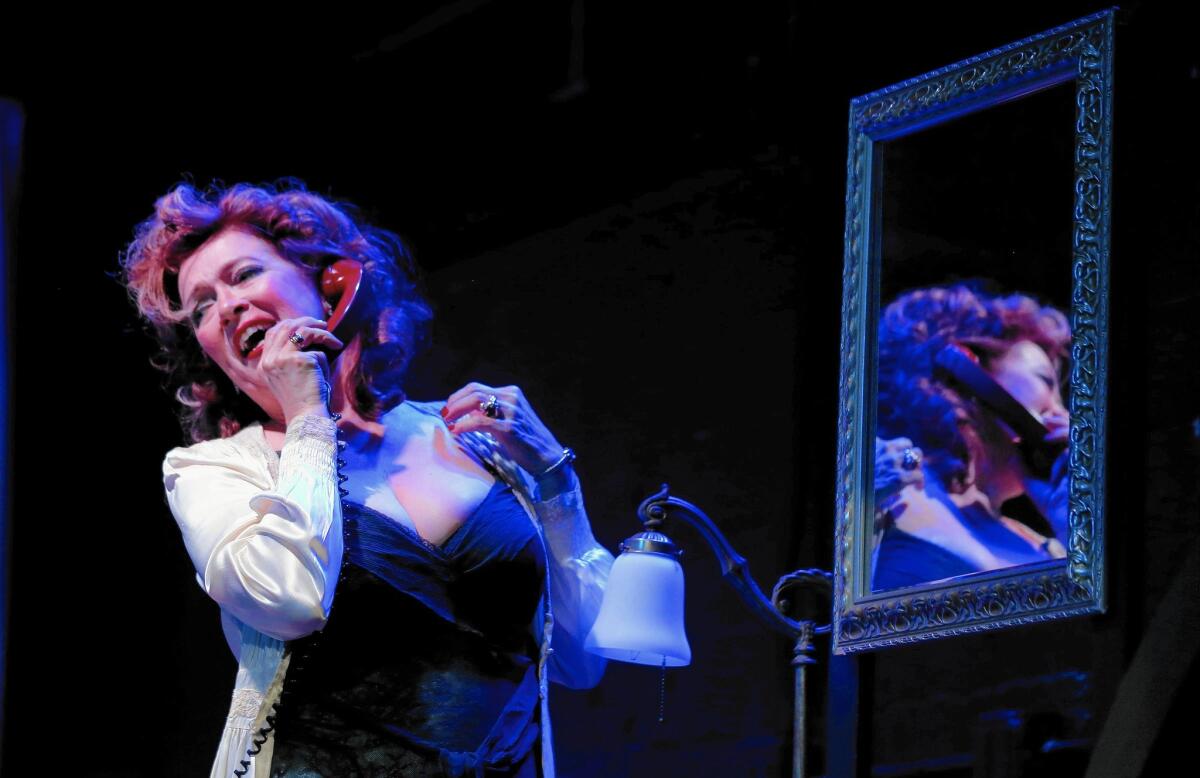Review: Suzan Hanson brings immediacy, authenticity to Long Beach Opera’s ‘La Voix Humaine’

The phone rings. The opera begins.
That’s an unwanted scenario that plays out nightly in opera houses around the world in this distracted age of cellphones. It is also the cue for the entrance of Elle in Francis Poulenc’s 1958 monodrama, “La Voix Humaine,” a one-way conversation of a woman on the telephone with the lover who has left her.
When technology is the theme, theater can become quickly dated. Long Beach Opera, which is presenting “La Voix Humaine” (The Human Voice), is happy to date. Based on a Jean Cocteau play from the ‘20s, the opera is being staged at the Underground Club of Long Beach’s Federal Bar, once a bank vault and now a nightclub. The simple bedroom set, with a piano off to one side, has a ‘50s feel with a relic: a red rotary telephone.
At Saturday night’s performance (the opera runs though April 17), Suzan Hanson could have been a glamorously drunk and disheveled Liz, on the phone to Dick Burton. This is a career-capping performance by a soprano capable of making bargain-basement opera (at not exactly bargain-basement ticket prices) matter.
Hanson’s work is cut out for her. The setting and production remove all the fabric from the operatic safety net, with the orchestra as the first and most important property to go. Poulenc treats Cocteau’s text as devastatingly emotional, sung speech, rising only to lyric song when Elle becomes nostalgic, lyricism meant as an even more devastating state of unreality.
The orchestra is needed to create the psychological atmosphere in a way much like Bernard Herrmann’s scores do in Alfred Hitchcock films of around the same period as the opera. Think of the “Psycho” shower scene with just a piano.
The next obstacle for Hanson is the English translation. Every note Poulenc wrote for his 50-minute opera has a French accent. “Voix Humaine” is not the sound of any woman’s voice but of this and only this French woman’s voice. Translation vulgarizes a work in which vulgarity is in already too easy reach.
Finally, there is the issue of intimacy. The opera is by its nature painfully intimate. Our eavesdropping on a woman’s loss of self-possession can seem humiliatingly voyeuristic in close quarters, as though we are listening through a neighboring thin wall. Indeed, Elle, on a party line, makes clear her need for privacy.
Without a proscenium, without an orchestra, without Cocteau’s elegantly horrific French text, Poulenc’s music can be in real danger of sinking into sensationalism. But Hanson’s consummate singing and acting turns every impediment in this silly bar into advantage. So too does pianist Kristof Van Grysperre, whose crisp, unsentimental playing startlingly denudes Poulenc’s orchestral score. Stark harmonies in particular are made gut-wrenching in their surprising modernity without their swank instrumental colors.
Hanson’s approach is not particularly novel. Actresses fall apart on stage often enough, as do opera singers on the lyric stage. We’ve also, over the years, seen Hanson in a vast range of roles — whether Medea, Lady Macbeth or Pat Nixon — in stagings traditional and unconventional. Her versatility is remarkable, even if some characters suit her better than others.
As Elle, she has no use for pretense. The words are hers; the conversation is hers. In English with piano, she has no place to hide vocally or theatrically. Yet with her flawless articulation and vocal nuance true to every dramatic utterance, Hanson produces a raw immediacy that adds a remarkable authenticity.
How this “Voix Humaine” fits into the bigger arts picture is also fascinating. One could see the one-woman Samuel Beckett plays written in Paris not long after Poulenc’s opera — and coincidentally being acted by Lisa Dwan at the Broad Stage in Santa Monica (where Long Beach Opera will mount its next production in June) — as a reductive reaction to “Voix Humaine.” Yet, ironically, Hanson’s utter lack of pretense of the performance made her, I thought, the greater, purer, more believable Beckett figure.
Erik Satie, so on the scene at the moment (part of the Black Mountain College show at the Hammer Museum and also the subject of Thursday night’s John Cage premiere at REDCAT), takes a bow with this “Voix Humaine.”
Rather than stage another operatic work along with “Voix Humaine,” Long Beach Opera filled time in the first half of the evening with a penny-pinching potpourri of Poulenc and Satie tidbits featuring baritone Robin Buck and two Cal State Long Beach students (violist Seulgee Park and cellist Christopher E. Brown).
The most amusing was Satie’s brief “Three Distinguished Waltzes of a Jaded Dandy,” smartly played by Van Grysperre with Buck wittily acting the part of the dandy who warns us, among other things, of a “newspaper abandoning half of itself.”
Yes, that’s a worry everywhere as the modern world figures out what to do, and Long Beach Opera abandons the first half of an opera evening. But with its extraordinarily compelling “Voix Humaine,” the company compensates with proof, at least, that however much the technology for transmitting the human voice changes over time, the voice itself is what counts.
------------
‘La Voix Humaine’
Where: Federal Bar’s Underground Club, 102 Pine Ave., Long Beach
When: 8 p.m. Thursday-Saturday, 3 p.m. Sunday
Tickets: $67.25-$137.25
Info: (562) 432-5934 or www.longbeachopera.com
Running time: 1 hour, 40 minutes
More to Read
The biggest entertainment stories
Get our big stories about Hollywood, film, television, music, arts, culture and more right in your inbox as soon as they publish.
You may occasionally receive promotional content from the Los Angeles Times.







